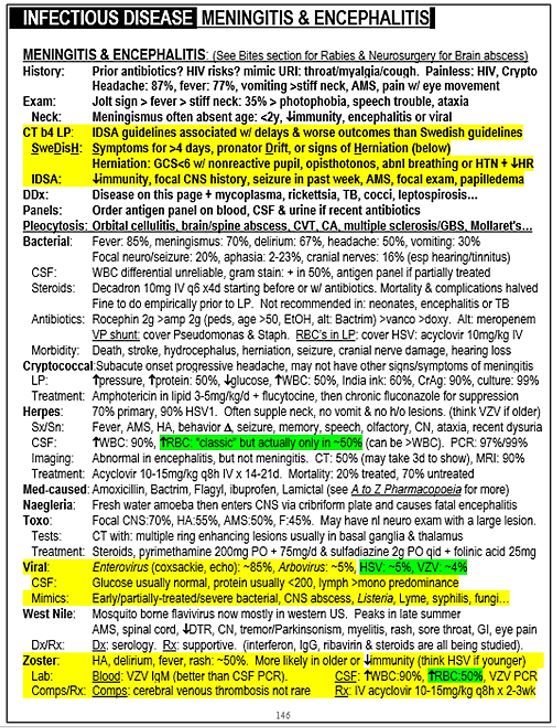- Clinical Technology
- Adult Immunization
- Hepatology
- Pediatric Immunization
- Screening
- Psychiatry
- Allergy
- Women's Health
- Cardiology
- Pediatrics
- Dermatology
- Endocrinology
- Pain Management
- Gastroenterology
- Infectious Disease
- Obesity Medicine
- Rheumatology
- Nephrology
- Neurology
- Pulmonology
Case Report: Worsening Headache, Chills, No Fever
A 66-y/o man presents with worsening generalized headache x2 days plus chills and dry cough. Initial concerns: encephalitis, influenza, URI, pneumonia? Your Dx?
Zoster/Viral Meningitis from The Emergency Medicine 1-Minute Consult Pocketbook

Patient history: A 66-year-old man presents to the emergency department with 2 days of worsening generalized headache associated with chills and a dry cough but no fever, vomiting, eye discomfort, neck stiffness, weakness, or other complaints.
Examination: Vital signs were normal. Physical exam was normal except for an occasional dry-sounding cough. Specifically, there was no photophobia, neck stiffness, abnormalities on pulmonary examination, or focal findings on neurologic exam.
Initial concerns: Meningitis, encephalitis, influenza, URI, pneumonia
Testing:
Laboratory: normal except for WBC of 17 with no bands. Flu swab negative
Chest x-ray: normal
CT brain (performed because age >65): normal
CSF: WBC, 350 with 90% lymphs; RBC, 1; glucose, 80 mg/dL; protein, 200 mg/dL
ED Course:The patient was given a dose of dexamethasone and ceftriaxone prior to CT & LP. After the LP results came back a dose of IV acyclovir was ordered, and the patient was admitted. On the floor acyclovir was stopped by the admitting team because there was only 1 RBC in the CSF.
Questions:
1. Was it a good idea to rule out HSV or VZV meningitis based on low RBC count in CSF?
2. Where can I get a quick refresher on this topic?
Please click below for answers and discussion.
Answers
1. Was it a good idea to rule out HSV or VZV meningitis based on la ow RBC count in CSF? No
2. Where can I get a quick refresher on this topic? See highlighted area on sample page below Discussion
There has been some controversy in the literature regarding whether apparent viral or aseptic meningitis (lymphocytic or monocytic predominant pleocytosis in CSF) always requires hospital admission.
My opinion is "yes," because there are many nonviral conditions that can mimic aseptic meningitis (see "Viral" section on sample page below) and also because almost 10% of cases of viral meningitis are caused by either HSV or VZV, neither of which are benign and for both of which there are treatments.
In these cases my practice is to treat with acyclovir IV and admit. I do not pay attention to the RBC count in the CSF because only ~50% of cases of HSV or VZV meningitis will have elevated CSF RBCs. If I am suspicious for one of the mimics I will also treat for that, especially if the patient has recently been on antibiotics and could have partially treated meningitis.
If the headache has been going on for more than 4 days and the LP is positive I will also usually consider head CT to check for a brain abscess if I did not do it prior to LP; brain abscess can mimic viral meningitis on LP but usually presents more indolently (see "CT b4 LP" section on sample page below).
VZV meningitis is not often tested for even though it is almost as common as HSV. It is more common in older patients and those who are immunocompromised, so if you are concerned about possible HSV meningitis in a patient like this, test for VZV also. If there is a Zoster-like rash this is obvious, but half of cases have no rash. When testing, also ad a VZV IgM serology, which is more sensitive than CSF testing.
Treatment is with IV acyclovir and if the headache is not improving as expected, consider an MR venogram as there is not uncommonly a venous vasculitis from VZV that can cause DVTs in the brain.
Case conclusion
CSF was positive for VZV. Acyclovir IV was restarted and antibiotics were stopped. The patient continued to have headaches and eventually was diagnosed with a cerebral venous thrombosis
Lessons
- Meningitis that seems to be viral is not always benign.
- Close to 10% of viral meningitis is caused by either HSV or VZV (~5% each).
- An elevated CSF RBC count is seen in only ~50% of HSV or VZV meningitis.
- Cerebral venous thrombosis is not rare in VZV meningitis.
- Other treatable forms of meningitis that can mimic a viral cause include brain abscess plus others.
